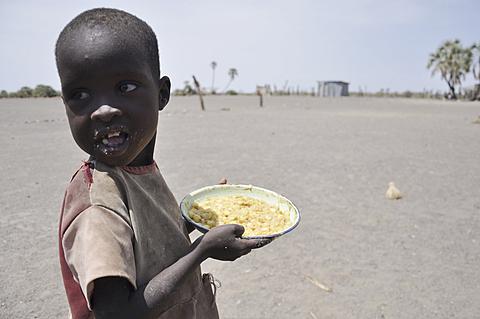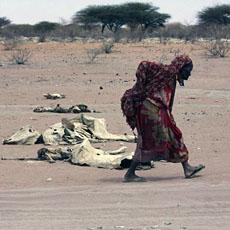
This is the VOA Special English Agriculture Report.
Pastoralism remains a way of life in East Africa. Herders travel from place to place in the dry, dusty deserts to find food and water for their animals. But some people think this movement of livestock is bad for the environment. They say pastoralists should settle on farms and grow their own food, especially in times of shortages.
Not everyone agrees. Experts recently met in Nairobi to discuss what to do about food shortages caused by drought. They say pastoralists make the best use of resources.
David Mwangi at the Kenya Agricultural Research Institute says grasslands have time to recover.
DAVID MWANGI: "Pastoralists would move in search for pasture and also water. Because what then would happen, if you are in a small area, the moment the water is exhausted, you would have to move to the next area where there is water. It gives the area you have left time to regenerate. And by the time you come back through the loop, this area now has pasture to graze."

Mr. Mwangi says the land used for animals is often not good enough for farming, especially during droughts. He and other experts say pastoralism makes the most sense for dry and semi-dry lands.
Jeff Hill directs policy for the Bureau of Food Aid at the United States Agency for International Development. He says arid and semi-arid lands represent about 80 percent of the Horn of Africa. Livestock-based economies in these areas provide up to 40 percent of agricultural production in Ethiopia and 50 percent in Kenya. And in Somalia, Mr. Hill says, the percentage is even higher.
JEFF HILL: "In Somalia, livestock systems fuel the economy."
An estimated 90 percent of the meat eaten in East Africa comes from pastoralist herds.
Mr. Hill says Kenya and other governments have only recently recognized the value of arid and semi-arid lands. These lands have often been excluded from government planning and road building. Herders can face limited access to grazing and watering areas.
Researcher David Mwangi says communities need to be creative with the resources they have. He says a good example is a project in Kenya in which grass is grown in the desert to feed livestock.
DAVID MWANGI: "What would happen if we developed a system where we grow fodder and pasture along the river and the animals are taken off from the range and finished nearer to the market? What we need is a system, and that is what has been really lacking."
He also says more efforts need to be put into raising camels. Camels are often the only animals that produce milk during a drought.
And that's the VOA Special English Agriculture Report, written by Jerilyn Watson with Cathy Majtenyi. I'm Jim Tedder.
pastoralism: a writing style that focuses on the life of shepherds or herdsman 牧歌体;田园主义
pastoralist: Austral a grazier or land-holder raising sheep, cattle, etc., on a large scale 牧民
Drought threatens Turkana way of life in Kenya
Experts link East Africa drought to La Nina in the Pacific
Emergency meeting held on Horn of Africa famine and drought
US pledges aid for drought-stricken Somali refugees
(来源:VOA 编辑:张若琼)
